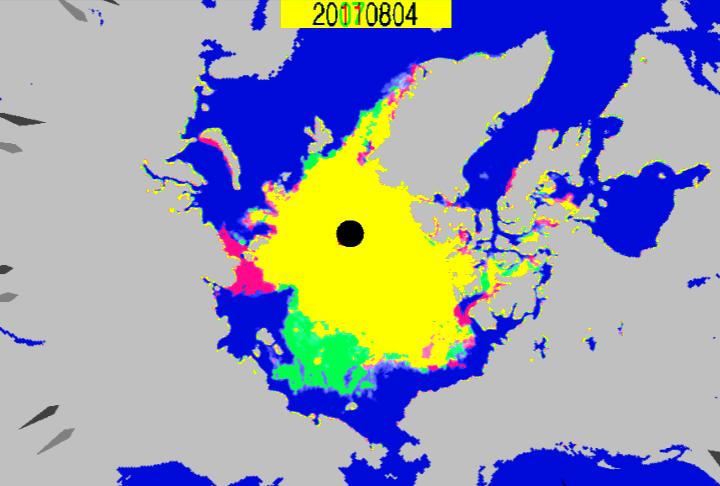In 2007, the East Siberian Sea was in rapid retreat. Green shows 2011 ice not present in 2007, and red is the opposite. The red areas are shrinking, while the green areas are growing very fast.
Disrupting the Borg is expensive and time consuming!
Google Search
-
Recent Posts
- “Why Do You Resist?”
- Climate Attribution Model
- Fact Checking NASA
- Fact Checking Grok
- Fact Checking The New York Times
- New Visitech Features
- Ice-Free Arctic By 2014
- Debt-Free US Treasury Forecast
- Analyzing Big City Crime (Part 2)
- Analyzing Big City Crime
- UK Migration Caused By Global Warming
- Climate Attribution In Greece
- “Brown: ’50 days to save world'”
- The Catastrophic Influence of Bovine Methane Emissions on Extraterrestrial Climate Patterns
- Posting On X
- Seventeen Years Of Fun
- The Importance Of Good Tools
- Temperature Shifts At Blue Hill, MA
- CO2²
- Time Of Observation Bias
- Climate Scamming For Profit
- Climate Scamming For Profit
- Back To The Future
- “records going back to 1961”
- Analyzing Rainfall At Asheville
Recent Comments
- John Francis on Ice-Free Arctic By 2014
- Bob G on Climate Attribution Model
- Bob G on Climate Attribution Model
- Bob G on Climate Attribution Model
- Robertvd on “Why Do You Resist?”
- arn on “Why Do You Resist?”
- Gamecock on “Why Do You Resist?”
- Bob G on Climate Attribution Model
- Gordon Vigurs on Climate Attribution Model
- Bob G on Climate Attribution Model



Well the largest red area on the above map never melted out in 2007 so that will tend to stay red, where as the green has a chance of reducing because it is looking more and more crumbly on that side in 2011.
http://www.iup.physik.uni-bremen.de:8084/amsr/arctic_AMSRE_nic.png
However I think a victory for the green this year is highly likely.
Andy
ROFL
Steven … how about increasing very fast … the word growing implies freezing / refreezing (or at least it did to my poor coffee deprived noggin 😉
Check out the bloomberg headline … very annoying http://www.bloomberg.com/news/2011-08-05/arctic-sea-ice-may-approach-record-low-after-biggest-july-melt.html
Julienne was having an interesting debate with Latitude yesterday about the prospect of ships sailing across the Arctic in future.
And yet Julienne admits we cannot forecast ice conditions more than a week in advance cos “it is weather”. I can’t see shipping companies sending fleets of ships up there so they can wait around until they get a decent week’s weather.
Paul, perhaps I didn’t explain it very well. The chaotic nature of weather makes it unpredictable beyond a few days. So saying what the ice conditions will be regionally from one year to the next (i.e. will the NSR or the NWP be open) will depend in part on what the winds are doing (i.e. in 2007 circulation pushed ice against Siberia, blocking the NSR from opening). Similarly, trying to determine whether a particular year will be a new record low or not is also not possible. However, projecting long-term average changes in the summer ice cover based on a warmer world is a very different issue, and that’s what companies are using for ramping up their shipping operations. As an analogy, while we cannot predict the age at which any particular man will die, we can say with high confidence that the average age of death for a man in industrialized countries is ~75.